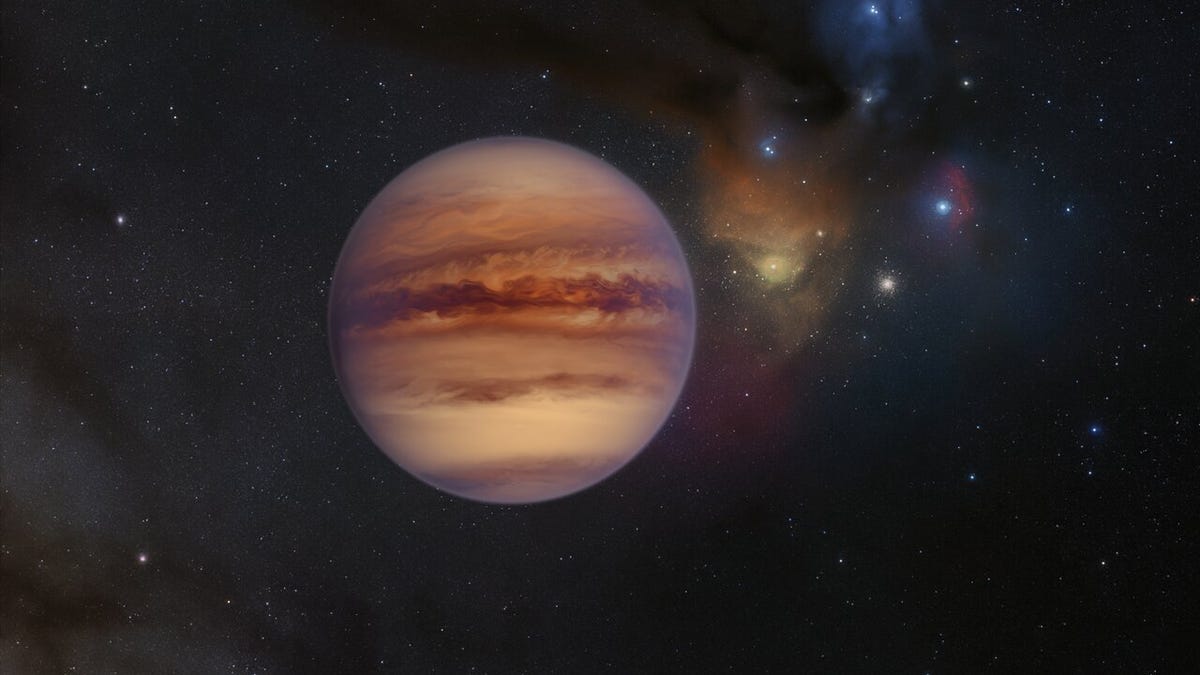Scientists discover at least 70 rogue planets wandering the universe, all alone
It's the largest group yet of lonely orbs without a home.

An artist's impression shows an example of a rogue planet detected in the Rho Ophiuchi region where ESO observations recently helped uncover at least 70 of these objects.
Between solar systems and black holes are vast regions of darkness. Deep within one of those void-like pockets, scientists recently discovered at least 70 rogue planets, traversing the cosmos all alone.
Researchers detail these isolated orbs in a study Wednesday in the journal Nature Astronomy. Each is about the mass of Jupiter, and they're located around the Upper Scorpius and Ophiuchus constellations, a star-forming area relatively near our sun. Despite the planets' proximity to such stellar forces, they don't orbit a star of their own.
Unlike Earth and most other planets, which do orbit a star, these outsiders don't have sunrises or sunsets. They don't watch the seasons pass and can't feel any sort of warmth.
Though scientists don't know for sure how rogue planets like these came to their solitary lifestyles, they have a few ideas. Some speculate the planets could've been knocked out of their parent system. Others suspect they formed from the collapse of a gas cloud too small to offer a star companion.
"There could be several billions of these free-floating giant planets roaming freely in the Milky Way without a host star," project lead Hervé Bouy, an astronomer at the Laboratoire d'Astrophysique de Bordeaux, France, said in a statement.
The team's discovery of these 70 spheres -- the largest nomadic group ever uncovered -- comes as a surprise. Pinpointing rogue planets is typically difficult because of their lack of anchor stars. Living without a star means existing sans illumination, so telescopes can't simply pick up on such planets.
"These objects are extremely faint and little can be done to study them with current facilities," Bouy said.
Núria Miret-Roig, first author of the study and an astronomer at the Laboratoire d'Astrophysique de Bordeaux, France said in a statement, "We did not know how many to expect and are excited to have found so many."
To overcome the usual limitations, the researchers used a heap of data collected from the European Southern Observatory's Very Large Telescope, the Visible Infrared Survey Telescope for Astronomy, and several other powerful mechanisms. "We used tens of thousands of wide-field images from ESO facilities, corresponding to hundreds of hours of observations, and literally tens of terabytes of data," Bouy said.
Miret-Roig added, "We measured the tiny motions, the colors and luminosities of tens of millions of sources in a large area of the sky."
Going forward, the team hopes to use yet another complex tool to analyze the sky. Astronomy has already been blessed with the Very Large Telescope, but wait till you hear about the Extremely Large Telescope under construction in the Chilean Atacama Desert.
According to the troop behind its construction, this telescope could "become the first telescope to find life outside our solar system." It aims to peer into the greatest depths of space with superhigh resolution, detect novel planets and even explore the nature of the dark universe.
"The ELT will be absolutely crucial to gathering more information about most of the rogue planets we have found," Bouy said. Perhaps it can finally unlock why these strange phenomena are such recluses.

